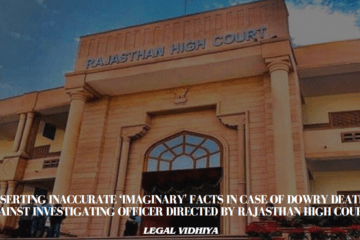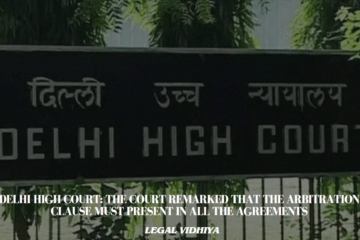
Justice Vikram Nath and Justice Pradhant Kumar Mishra granted leave to the state of Odisha in a government land forgery involving public officials engaged in document manipulation for selling government land at undervalued price .
In 2005, an FIR was registered by the then Special Secretary to the Government in the
General Administration (G.A.) Department, alleging a conspiracy to forge documents and illegally transfer valuable government land to private entities. The police investigated and filed a chargesheet against ten individuals, including the respondents charging them with the Sections 420, 467, 468,471, 477A, 120B and 34 IPC. The chargesheet stated that the respondents, along with others, used forged documents like Hata Patas, Ekpadia, and rent receipts to manipulate judicial processes and revenue records. These documents were presented in various courts to obtain favorable orders and support false claims of ownership over the disputed properties.
One of the central allegations was that the land located in Bhubaneshwar was leased to Kamala Devi under dubious circumstances. After her demise, her legal heir Kishore Chandra Patnaik asserted his right over the land even after it was declared ungenuine by the competent authority. Despite the findings that were not in favor, the OEA Collector and subsequent court rulings overturned earlier decisions and reinstated the lease. However, there were allegations of document manipulation and improper legal proceedings surrounding this.
In 2000, Kishore Chandra Patnaik gave GPA ( general power of attorney) to Anup Kumar Dhirsamant the power to manage and sell the property. Later, it was discovered that the document was changed to benefit the respondents and other accused individuals. Dhirsamant sold parts of the land to the respondents at much lower prices than the market value, without proper verification of the title’s legitimacy or the authenticity of the document.
On September 26, 2015, the SDJM in Bhubaneshwar issued a process against the respondents and other accused persons based on the charges of offenses under various sections of the IPC. The respondents challenged this order in the High Court. The High Court later quashed the order, stating that there was insufficient evidence of a conspiracy directly involving the respondents. The State argues that the High Court overlooked circumstantial evidence of a broader conspiracy and didn’t consider the seriousness of the offenses and their impact on governance and public trust in land administration.
After considering both sides, this Court believes that the High Court’s order should be reconsidered. The investigation revealed that Respondent No. 1 and Respondent No. 2 played crucial roles in misusing the GPA and carrying out improper property transactions. There is a strong case for further examination. Initially, Kishore Chandra Patnaik granted a GPA to M/s Millan Developer and Builders Pvt. Ltd., represented by Anup Kumar Dhirsamanta. This GPA was registered outside the proper jurisdiction by including an unrelated parcel of land, which was a key factor in the subsequent illegal activities.
The manipulation of the GPA, where they changed specific terms to misrepresent the granted authority, was done with the help of a junior clerk named Ajya Kumar Samal. This forgery was a deliberate attempt to bypass the legal procedure for property transfer. After the forgery, lands were sold at significantly lower prices. For example, prime lands in Bhubaneswar city were acquired for only Rs. 9,000 per acre, while the market rates were over Rs. 50 lakhs per acre. This drastic undervaluation raises questions about the intentions behind these transactions, suggesting a scheme to avoid proper stamp duties and registration fees, causing a loss to the state. Part of this land was suspiciously bought by Respondent No. 1 and Puspa Choudhury, managed by Prahallad Nanda, who was temporarily in charge of the Sub-Registrar’s office. The intentional undervaluation and the involvement of Respondent No. 1, along with the fraudulent tampering of the GPA, indicate a clear scheme to misappropriate government property and cause losses to the public exchequer.
The High Court’s ruling to dismiss the proceedings was based on an incomplete assessment of the facts. A detailed trial is necessary to fully unravel the alleged conspiracy, the involvement of the respondents, and the actual harm caused to the public exchequer. The High Court hastily concluded that there was no evidence of collusion between the other accused persons and the respondents. This can only be determined after a thorough examination of evidence and witnesses in a trial setting. The Trial Court is directed to expedite the trial process since the FIR is from 2005.
CASE TITLE : THE STATE OF ODISHA vs NIRJHARINI PATNAIK @ MOHANTY & ANR, SLP (Crl.) No.5758 OF 2018)
Written by: Ayesha Hussain, College name : Surendranath Law College, 4th year B.A.LL.B(HONS), Intern under Legal Vidhiya
REFERENCES
https://indiankanoon.org/doc/91917167
Disclaimer: The materials provided herein are intended solely for informational purposes. Accessing or using the site or the materials does not establish an attorney-client relationship. The information presented on this site is not to be construed as legal or professional advice, and it should not be relied upon for such purposes or used as a substitute for advice from a licensed attorney in your state. Additionally, the viewpoint presented by the author is of a personal nature




0 Comments